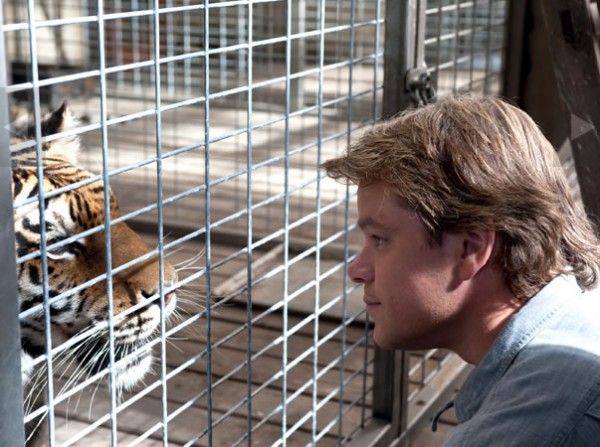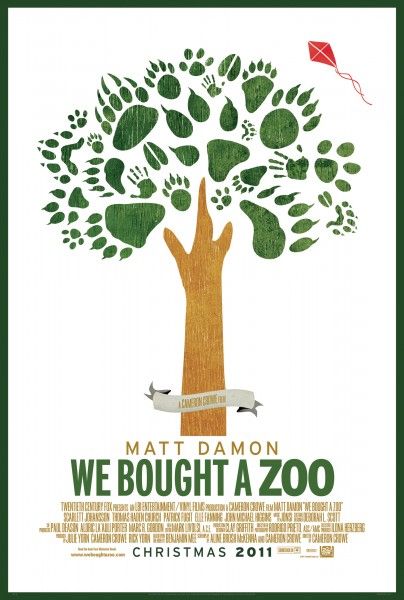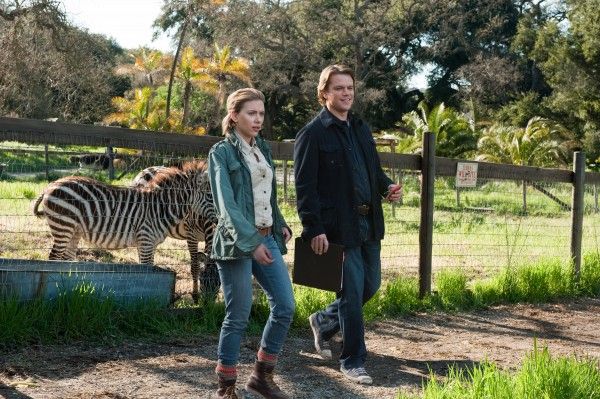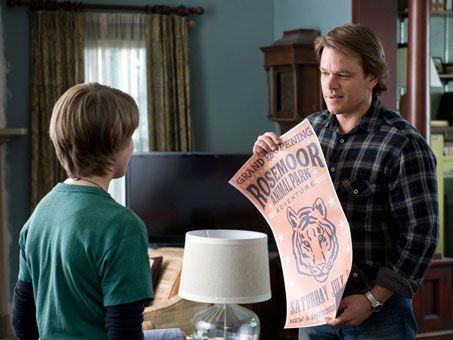Acclaimed filmmaker Cameron Crowe’s latest film, We Bought A Zoo, is based on the inspiring true story of Benjamin Mee (Matt Damon), an adventure-seeking journalist and single dad, who is looking to give his family a much-needed fresh start and ends up moving to a home situated in the middle of a zoo. While he and his two children attempt to bring the zoo back to its once glorious state, the Mee family, the eccentric team of zoo employees – including head zookeeper Kelly Foster (Scarlett Johansson) – and dozens of exotic animals, bond in ways they never could have imagined.
During this exclusive phone interview, the undeniably charming and easy to talk to filmmaker explained why he identified with this particular story, what made Matt Damon his perfect leading man, building a zoo from scratch and working with 70 exotic animals, why Jónsi (of the band Sigur Rós) was the right musician to do the score, finding the poetic moments of a story, and the importance of taking great risks, in your own life. He also talked about how strange it is to hear his dialogue often quoted, his upcoming documentary The Union (due out in January 2012), showcasing the musical collaboration between Elton John and Leon Russell, and that his next film will be an as-yet-untitled comedy, that he hopes to start shooting in the Spring. Check out what he had to say after the jump.
How did you first become aware of this story and the book that Benjamin Mee wrote, and what was it that you most identified with, that made you want to bring it to the big screen?
CAMERON CROWE: I guess I liked that Benjamin Mee was a journalist, and so he had a great detailed sense about his own story and the way he captured it. But, I think it was mostly his impossible dream, which he’s still living. When I last talked to him, he said he’s four years into a brief rainy system that he’s hoping will pass, so people will start showing up to the zoo. And, he doesn’t give up. He came to the set and he was that guy. It was like he walked right out of his own documentary. I loved that it was the human adventure, in great detail, and I felt like I could collaborate with that story.
Once you signed on to direct it, did you make a lot of changes to the script?
CROWE: Yeah. There was a story that really stuck with me, which was that there was a very famous actress that was after the rights of We Bought a Zoo. I guess she was thinking of the story to be more of Katherine’s story, before she died. She met with Benjamin Mee, and the actress pitched the story and everything. Benjamin’s reaction later, privately, was, “She’s not beautiful enough to be my Katherine,” meaning on the inside. I heard that and I just thought, “Wow, this guy’s love is so strong and so true. Our movie should be a portrait of that love, that doesn’t get revealed, fully, until the last two words of the movie, where we realize the entire movie has been an adventure launched by her.” That was a big reason for making the movie, and that was a change I definitely made from the first draft. It was my interpretation, I guess.
In a role that relies on the character being likable, what was it about Matt Damon that made him the perfect actor for this?
CROWE: Matt’s a guy that can do drama. He’s that rare guy that makes it look easy. He’s like James Stewart, or one of those guys, where you don’t realize how valuable they truly are, until years later when they go, “Get me another James Stewart,” and there’s nobody, for a generation. That’s because it’s so hard to be a guy who’s romantic and funny and soulful, and will cry and just say, “I’m your partner, as an actor, and let’s do all this stuff. And, by the way, I’ll be a great father to these kids in your movie, and I’ll do a scene with a tiger.” I think there’s a list of one.
You had the kids, you had the animals, and you had to construct a zoo. What were the biggest challenges in making this? Was anything more difficult than the other, or was it all just a big challenge, in getting it all together?
CROWE: It was all a big challenge ‘cause I was in denial over it, and still am in denial. I said, “Did we really work with exotic animals? Did that really happen? Wow! How did that happen?” I think it happened just out of pure belief that we could do it. We were able to do it with a lot of help and the cast being so super-pro. I think it always was a movie about characters, to me – human characters and animal characters that weren’t talking animals, but just noble, exotic reminders of your responsibility and love. So, if I kept my head down and focused on the relationships, I knew I wouldn’t get overwhelmed with where the trainer is going to bring the lion in the enclosures. But, we built a zoo and had 70 animals and a slew of trainers, and made a personal movie out of it.
In taking on a story like this, how fine of a line is it, in making sure it’s not too melodramatic or sappy, but has the right emotional level with a good balance of laughs and tears?
CROWE: I just go by personal instinct. I did a book on Billy Wilder, who once said that there’s good sentimentality and bad sentimentality. I asked him, “What’s bad sentimentality?,” and he said, “You know when you see it!” So, I just think to myself, “Put your inner audience hat on and when you feel that it’s true and authentic, then you have it.” That’s what I do. I think it’s okay to be open-hearted. It’s when you do it with no back-up, or no memory or knowledge that darkness is necessary for the brightness, that it [feels untrue].
What was it about Jónsi , as a musician, that made you choose him to do the score for the film?
CROWE: It was his Go album. I love Sigur Rós, but the Go album, to me, was so intoxicating and positive while still being complex. It’s like, can you bring joy and positivity with equal measures of truth and depth? And, that’s his music. So, we started playing it on the set, and Matt [Damon] just responded to it immediately. Everybody did. It just felt like, “Man, if he could score this movie, that would be the musical voice that I’ve been searching for.” And, it turned out that he was available. So, he flew from Iceland and walked in with that theme that begins the movie, and we were off and running.
Do you know which project you’ll be doing next? Do you already have something in mind?
CROWE: I do. We’re going to hopefully start it in the Spring, and it’s more of a full-on comedy then We Bought a Zoo. I want to keep directing now because my writing phase has been fruitful. I want to keep my team together and keep directing.
Does that film have a title?
CROWE: It’s untitled. I’m predictable.
People that you work with say that you really like to find the poetry in things. Do you see that, in your work?
CROWE: I’m honored by the question. I just love when a movie takes a break and gives you a poetic moment, but sometimes it’s good when they just happen randomly. If your actors are really comfortable and you let the camera roll, sometimes things happen and you just see something that’s visually iconic, or emotionally that way. I just gravitate to that stuff. But, the next movie is a little more plotted, structurally. I was talking with a friend of mine and said, “But, what about the poetry?,” and they were like, “Oh, dude, the poetry will come, no matter what. You can’t stay away from that.” I was like, “Yeah, you might be right.” So, I’m actually trying to write that stuff out of the script right now and am letting it come in around the edges.
What were the challenges of directing We Bought a Zoo while also completing Pearl Jam Twenty and The Union, about Elton John and Leon Russell?
CROWE: It was a lot, but work breeds a certain type of energy. If you’re doing a bunch of stuff at the same time, it all feeds the other thing. I was lucky that the Pearl Jam movie was a great hobby, when I took a break from We Bought a Zoo. And then, when I wanted to take a break from those two, there was the Elton John documentary. The Elton John documentary, because of Elton John, had its own editorial structure because Elton John is such a showman. I found, after we filmed all this stuff, that basically every day of filming, he would look into the camera, at a certain point, and say, “I’m feeling this, and I’m waiting for this to happen. This is where I am on March 12, 2009.” It was like, “Thank you, Mr. Narrator.” That’s exactly the story we’re telling, so it was fun to edit. The biggest part of the Elton John documentary was all of the clearances. But, it was fun to do all that stuff. Actors get to do that a lot ‘cause they have three projects, or something, stacked up.
This film really illustrates how a lot of the greatest things ever accomplished really come from incredible risk. Is there a risk that you took, in your own life, that you look back on and are proud of because it changed things for you?
CROWE: Yeah. I think every time I’ve taken a leap and said, “I love you,” in a relationship, that was a risk ‘cause I really believe those words. Professionally, I think Vanilla Sky felt like a risk, at the time. I think it was something unexpected, from all of us that were doing the movie, but it seems like, 10 years or so later, that’s one of the movies people ask me about the most. That’s cool. It’s a daily thing, really, to just try to listen to that voice inside that says, “Go for it! Why not?” That’s a little bit of the point of We Bought a Zoo. If you keep the, “Why not?” alive, something great will happen. Sometimes things you write are messages to yourself, and that’s a message to stay on that track. Even though I think my stuff has a particular voice because you are who you are, it’s good to switch it up, professionally and personally. The dare to be great situation is always going to be the one that matters the most.
So many of your films have had very quotable dialogue. Is it strange for you to have people quote your movie lines?
CROWE: It is strange! I was watching [President] Obama speak once and he just said, “Show me the money!” I was like, “Woah, that’s bizarre!” That’s like somebody’s doing a prank video on you, or something. It’s a strange feeling, but it’s a total honor. The funny thing is, if you try to write something that’s memorable, you’ll never get it. Sometimes it’s the way the actor says the words that make it memorable.




